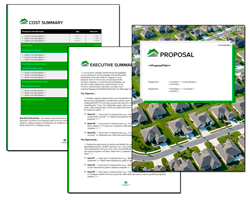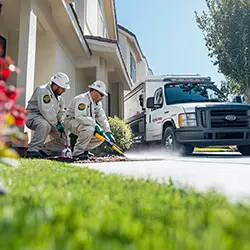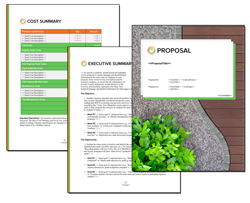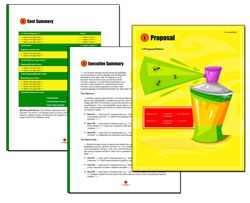
How to Write a Home and Property Proposal
If you're wondering how to write a home and property care proposal that stands out and wins clients, you're in the right place. This article provides a step-by-step guide to help you create a home and property proposal. You'll learn how to understand your audience, define your services, and create an executive summary that captivates potential clients.
Key Takeaways
- Craft a home and property care proposal that showcases your commitment and builds trust with potential clients.
- Tailor your proposal by understanding your audience and their specific needs to improve your chances of success.
- Include a executive summary and a strong call to action to engage your readers and drive them towards the next steps.
Understanding Home and Property Care Business Proposals
A proposal is much more than a document; it's your first impression - your handshake with potential clients. These proposals cover a wide range of services tailored to meet various property maintenance needs, such as lawncare, landscaping, pool maintenance, pest control, and general upkeep. Whether for single-family homes, homeowner associations, or large commercial complexes, these services are designed to keep properties in top condition, ensuring both functionality and curb appeal.
Detailing the services you offer - what will be done, the associated costs, and the benefits to the client - is crucial. The home and property care industry is highly competitive, and a well-structured proposal can significantly enhance your chances of securing contracts with homeowners, property managers, or HOA boards. This involves showcasing your expertise, qualifications, and commitment to meeting any relevant regulations or standards, such as local environmental guidelines or safety protocols. By clearly communicating your value, you set the stage for successful, long-term relationships with your clients.
Remember, your proposal is not just about listing services; it's about showcasing your commitment to providing services and building trust with potential clients.
Identifying Your Audience

Knowing your audience is the cornerstone of any successful proposal. Identifying who you are writing for allows you to tailor your services to their specific needs and concerns. Whether your audience includes Homeowners Associations, developers, or property managers, understanding their unique priorities is crucial.
Tailoring your proposal based on audience insights not only enhances the likelihood of winning their business but also ensures that you meet their expectations. Describing your understanding of their wants and needs addresses their requirements and alleviates any concerns.
Researching Potential Clients
Understanding your target market is critical. It allows you to tailor your services to meet the specific needs of property owners, homeowner associations, and property managers. One effective method is gathering feedback from existing clients to gain insights into their expectations and needs. This feedback can guide you in enhancing your service offerings - such as lawn care, landscaping, pool maintenance, or pest control - and in creating marketing materials that resonate with potential customers.
Building relationships with local realtors, property management firms, and community organizations can also facilitate referrals, bringing more clients to your home and property care business. Networking at local events and speaking with neighborhood associations can enhance your business's visibility and establish authority in your area. Additionally, forming partnerships and encouraging current clients to refer you are effective methods for attracting new customers.
Local connections can play a significant role in your success. Co-hosting property care workshops or listing your business on reputable online directories can turn neighbors into your first clients while also boosting trust and visibility among potential customers. These community connections often lead to referrals, which are compelling data points to include in your proposals.
Defining Your Services

Clearly defining the services you provide is important. Different home and property care services may require specific licenses and certifications based on local regulations. For example, you may need certifications for pesticide application, arboriculture, or pool maintenance. It's beneficial to mention any certifications you are working toward, especially if you are in the early stages of starting your property care business. Make sure to detail the services provided - explaining how they will meet the client's needs, the associated costs, and the benefits to the customer.
Including details about your management team and staff expertise helps build trust and showcases your proficiency. Highlighting the range of services - such as lawn care, landscaping, pool maintenance, and pest control - ensures that potential clients understand the full scope of what you can offer.
Creating the Executive Summary
The executive summary is the heart of your proposal. It serves as an important introduction that captivates the reader's interest and summarizes the essence of your proposal. A well-written executive summary should be concise and compelling, encapsulating the essence of the project and the justification for funding or accepting the proposal.
Incorporating an opening statement and highlighting both tangible and intangible benefits can engage the reader from the outset. Additionally, a well-constructed call to action (CTA) can significantly influence the success of your proposal, steering clients towards specific next steps.
Detailing Your Company Description

Establishing credibility in your company description is vital. Briefly mention past successes and qualifications to reassure the reader. Your business description should prominently feature your professional background and the types of services offered.
The purpose of this section is to explain to the customer why you should get the job, including information about your experience, credentials, personnel, company history, and any awards or testimonials. Demonstrating expertise in the home care industry can build trust and facilitate better client relationships.
Outlining Your Business Mission and Goals
Establishing a mission statement articulates why your home care agency exists and who it serves. A vision statement outlines the future aspirations of your agency and guides its long-term objectives. Involving your staff in creating these statements can help avoid generic clich s and enhance commitment.
Defining specific, measurable, achievable, realistic, and time-bound (SMART) goals is important for effective planning. Mission and vision statements serve as a foundation for operations and can positively influence client perception.
Creating a Management Structure

A well-defined management structure is crucial for the success of a home care business. It outlines the roles and responsibilities of each team member, ensuring that everyone is working towards the same goals. Depending on your business's needs and goals, you can choose from various management structures, including a sole proprietorship, partnership, or corporation.
When creating a management structure, consider the following:
- Define Roles and Responsibilities: Clearly outline the duties of each team member to ensure accountability and efficiency.
- Establish a Clear Chain of Command: Determine who reports to whom to streamline decision-making and communication.
- Decision-Making Process: Develop a process for making decisions to avoid confusion and ensure timely actions.
- Communication and Feedback System: Implement a system for regular communication and feedback to keep everyone informed and engaged.
- Conflict Resolution Process: Establish a method for resolving conflicts to maintain a harmonious work environment.
A well-defined management structure will help ensure that your home care business runs smoothly and efficiently, providing high-quality care to your clients.
Developing a Comprehensive Financial Plan with Financial Projections

While many proposals are pitches to potential clients for your services, startup or funding proposals are also commonly written for banks, lenders, and investors.
A well-defined financial plan is crucial for any home care business. Financial projections are important in a business plan as they demonstrate funding use and repayment plans. A detailed financial plan should encompass topics like business plan outlines, cash flow projections, income statements, and break-even analyses.
It's also important to outline startup costs, which may range from trucks and equipment to marketing expenses. Identifying diverse revenue streams is crucial for sustaining profitability. Regularly testing financial assumptions against market realities can help ensure the relevance of your financial support plan.
Understanding the market potential is important. Financial projections should cover at least three years to provide a comprehensive outlook.
Researching and Identifying Funding Opportunities
Securing financial support is an important step for any home care business. There are various funding opportunities available, including grants, loans, and investors. To research and identify these opportunities, consider the following strategies:
- Use Online Resources: Websites like the Small Business Administration (SBA) offer valuable information on funding options.
- Network with Other Business Owners and Service Professionals: Building relationships within the industry can lead to valuable funding leads.
- Attend Industry Conferences and Events: These gatherings are excellent for learning about new funding opportunities and connecting with potential investors.
- Reach Out to Local Organizations and Foundations: Many local community organizations and foundations provide funding for small businesses.
When identifying funding opportunities, ensure that your business goals align with the funding criteria. Develop a strong proposal that highlights your business's unique value proposition and follow up with the funding organization to ensure your proposal is being considered.
Some potential funding opportunities for home and property care businesses include:
- Small Business Administration (SBA) Loans: Various loan programs, such as the SBA 7(a) Loan and Microloan programs, can provide funding for equipment, supplies, and operational costs.
- State and Local Economic Development Grants: Many cities and states offer grants or low-interest loans for small businesses, especially those involved in sustainability, landscaping, or environmentally friendly services.
- Green Business Incentive Programs: Organizations like the U.S. Environmental Protection Agency (EPA) and local utility companies may offer grants or rebates for businesses using eco-friendly landscaping techniques, water conservation systems, or energy-efficient equipment.
- Private Foundations and Industry Associations: Groups like the National Association of Landscape Professionals (NALP) and The Home Depot Foundation may provide funding or resources for small property maintenance businesses.
- Business Incubators and Entrepreneur Programs: Some local business development centers and non-profit organizations provide funding, mentorship, and business resources for startups in the home services industry.
Exploring these options can help property care businesses secure funding for equipment, staffing, and business growth.
Creating a Marketing Plan
Creating a strong marketing plan is important for the success of your home care business. A strong brand identity can help differentiate your agency from competitors, making it more appealing to potential clients. Clearly outlining unique offerings can attract new customers.
Developing a strong SEO strategy boosts visibility in both Google Maps and organic search results. Using Google Ads can help quickly position your home care agency at the top of search results. Using Facebook ads can promote your blog posts and client testimonials to local audiences.
Encouraging referrals from existing clients is another effective method of gaining new customers. Sponsoring community events can improve brand visibility and foster connections within the local community. Collecting online reviews can significantly improve your agency's reputation and attract new clients.
Providing Supporting Data

Supporting data is crucial in building credibility and trust with potential clients. Collecting positive reviews from clients on third-party sites enhances credibility and can increase revenue. Performance statistics, such as client satisfaction scores, provide measurable evidence of service quality.
Using client testimonials illustrates the impact of personalized care plans on client well-being. Case studies can showcase specific examples of successful interventions, enhancing the credibility of proposals. Addressing potential objections within a proposal presentation can preemptively alleviate concerns from the audience.
A well-written proposal presentation helps build trust and establish a strong rapport with potential clients or investors.
Ensuring Professional Presentation
A professional presentation is critical in proposals as it instills confidence in potential funders. Key topics include thorough proofreading, consistent formatting, and logical structure. Proofreading ensures professionalism; errors in spelling and grammar may lead clients to doubt the quality of your services.
Using templates from the Proposal Kit ensures consistency in formatting and presentation across different proposals. Using a professional template can streamline the proposal writing process and help ensure a polished final product.
Evaluating and Improving the Proposal
Evaluating and improving your proposal is an important step in securing funding for your home care business. To ensure your proposal is as strong as possible, consider the following:
- Review for Clarity and Concision: Make sure your proposal is easy to understand and free of unnecessary jargon.
- Align with Funding Opportunity: Ensure that your proposal meets the specific requirements and goals of the funding opportunity.
- Evaluate Strengths and Weaknesses: Identify areas where your proposal excels and where it may need improvement.
- Seek Feedback: Get input from peers and industry experts to gain different perspectives and insights.
To improve your proposal, revise it based on the feedback and evaluation. Ensure that it is well-organized and easy to follow, using clear and concise language. Highlight your business's unique value proposition and include a detailed budget and financial projections.
Some tips for improving your proposal include:
- Use a Clear and Concise Executive Summary: Capture the essence of your proposal in a way.
- Highlight Unique Value Proposition: Emphasize what sets your business apart from competitors.
- Include Detailed Budget and Financial Projections: Provide a comprehensive financial outlook to demonstrate viability.
- Ensure Organization and Clarity: Make your proposal easy to navigate and understand.
By following these tips, you can enhance your proposal and increase your chances of securing the necessary funding for your home and property care business.
Here are some related samples included in every downloadable Proposal Pack
The AI Writer generates a first draft of these templates - customized to your company, client, and project - in just minutes, giving you a head start on editing. Get any Proposal Pack or Proposal Kit Professional, and all of these samples, and the AI Writer are included.
- Lawn Care and Landscaping Services Proposal
- Contractor Home Remodel Services Proposal
- Energy Efficiency Sample Proposal
- Network Cabling Sample Proposal
- Painting Contractor Sample Proposal
- Plumber Services Sample Proposal
- Heating and Air Conditioning Sample Proposal
- Roofing Contractor Sample Proposal
- Electrical Contractor Sample Proposal
- Architectural Design Sample Proposal
- Pest Control Services Sample Proposal
- Pest Control Information Packet Sample
- Masonry Contracting Services Sample Proposal
- Artificial Intelligence Project Sample Proposal
- Smart Home Automation Project Sample Proposal
- Woodworking Contractor Services Sample Proposal
- Interior Decorator Design Services Sample Proposal
Here are some related downloadable templates
The AI Writer generates a first draft of these templates - customized to your company, client, and project - in just minutes, giving you a head start on editing. Get any Proposal Pack or Proposal Kit Professional, and all of these templates and the AI Writer are included.
- Arborist Services Proposal Template
- Interior Decorator Design Services Proposal
- Landscaping Services Proposal Template
- Lawn Care Service Proposal Template
- Lawn Care and Landscaping Services Proposal
- Tree Trimming Services Proposal
- Interior Design Proposal Template
- Interior Design Service Proposal Template
- Landscape Design Proposal Template
- Landscape Proposal Template
- Landscaping Proposal Template
- Lawn Care Proposal Template
- Lawn Maintenance Proposal Template
- Lawncare Proposal Template
Following Submission Guidelines
Following submission guidelines is crucial because overlooking details can result in disqualification. Neglecting to follow guidelines can lead to immediate rejection, regardless of the proposal's strength. Attention to detail is important to ensure that proposals meet all submission requirements to prevent disqualification.
Adhering to submission guidelines significantly enhances the chances of proposal acceptance and success.
Sending Out Proposals
Proposals can be sent as a PDF file via email or as a printed copy delivered by messenger, mail service, or by hand. To create a strong impression, choose the format that best appeals to the prospective client, whether it's a PDF via email or a printed version delivered directly.
Including a Call to Action
A call to action (CTA) serves as a prompt that encourages the audience to take a specific action, such as scheduling a meeting or signing a contract. Calls to action can vary in length from simple phrases like 'Buy Now' to more elaborate prompts such as 'Subscribe today to receive updates.'
A well-constructed CTA can significantly influence the success of your proposal, steering clients towards specific next steps.
Using Proposal Kit for Efficiency
Proposal Kit provides templates for over a thousand proposal topics to assist users in writing proposals efficiently. Proposal Kit Professional includes features such as legal contracts, a free design theme pack, custom branding, and customizable quoting databases.
The software facilitates collaboration by allowing multiple users to work on the proposal simultaneously, which improves efficiency.
 Proposal Kit Professional provides the most content, including legal contracts and a free design theme pack. Plus, advanced software features include custom branding and customizable quoting databases.
Proposal Kit Professional provides the most content, including legal contracts and a free design theme pack. Plus, advanced software features include custom branding and customizable quoting databases. Proposal Pack for Any Business covers this type of proposal and includes samples. There are also some commonly used specialty design themes available:
Proposal Pack for Any Business covers this type of proposal and includes samples. There are also some commonly used specialty design themes available:Photo Design Proposal Packs
 Proposal Pack Architecture #3
Proposal Pack Architecture #3 Proposal Pack Construction #5
Proposal Pack Construction #5 Proposal Pack Construction #8
Proposal Pack Construction #8 Proposal Pack Contemporary #20
Proposal Pack Contemporary #20 Proposal Pack Decorator #3
Proposal Pack Decorator #3 Proposal Pack Decorator #4
Proposal Pack Decorator #4 Proposal Pack Electrical #5
Proposal Pack Electrical #5 Proposal Pack HVAC #2
Proposal Pack HVAC #2 Proposal Pack Janitorial #3
Proposal Pack Janitorial #3 Proposal Pack Janitorial #4
Proposal Pack Janitorial #4 Proposal Pack Lawn #3
Proposal Pack Lawn #3 Proposal Pack Lawn #4
Proposal Pack Lawn #4 Proposal Pack Painter #4
Proposal Pack Painter #4 Proposal Pack Pest Control #2
Proposal Pack Pest Control #2 Proposal Pack Plumbing #2
Proposal Pack Plumbing #2 Proposal Pack Real Estate #5
Proposal Pack Real Estate #5 Proposal Pack Real Estate #6
Proposal Pack Real Estate #6 Proposal Pack Roofing #2
Proposal Pack Roofing #2 Proposal Pack Sanitation #1
Proposal Pack Sanitation #1 Proposal Pack Skyline #4
Proposal Pack Skyline #4
Line Art Design Proposal Packs
 Proposal Pack Aqua #2
Proposal Pack Aqua #2 Proposal Pack Architecture #1
Proposal Pack Architecture #1 Proposal Pack Architecture #2
Proposal Pack Architecture #2 Proposal Pack Construction #1
Proposal Pack Construction #1 Proposal Pack Construction #2
Proposal Pack Construction #2 Proposal Pack Construction #3
Proposal Pack Construction #3 Proposal Pack Construction #4
Proposal Pack Construction #4 Proposal Pack Decorator #1
Proposal Pack Decorator #1 Proposal Pack Decorator #2
Proposal Pack Decorator #2 Proposal Pack Electrical #1
Proposal Pack Electrical #1 Proposal Pack Electrical #2
Proposal Pack Electrical #2 Proposal Pack Electrical #3
Proposal Pack Electrical #3 Proposal Pack HVAC #1
Proposal Pack HVAC #1 Proposal Pack Janitorial #1
Proposal Pack Janitorial #1 Proposal Pack Janitorial #2
Proposal Pack Janitorial #2 Proposal Pack Lawn #1
Proposal Pack Lawn #1 Proposal Pack Lawn #2
Proposal Pack Lawn #2 Proposal Pack Painter #1
Proposal Pack Painter #1 Proposal Pack Painter #2
Proposal Pack Painter #2 Proposal Pack Pest Control #1
Proposal Pack Pest Control #1 Proposal Pack Plumbing #1
Proposal Pack Plumbing #1 Proposal Pack Real Estate #1
Proposal Pack Real Estate #1 Proposal Pack Real Estate #2
Proposal Pack Real Estate #2 Proposal Pack Real Estate #3
Proposal Pack Real Estate #3 Proposal Pack Real Estate #4
Proposal Pack Real Estate #4 Proposal Pack Roofing #1
Proposal Pack Roofing #1 Proposal Pack Skyline #1
Proposal Pack Skyline #1 Proposal Pack Skyline #2
Proposal Pack Skyline #2 Proposal Pack Skyline #3
Proposal Pack Skyline #3
Summary
Summarize key points of the blog post, highlighting the importance of each section. End with an inspiring phrase encouraging readers to take action.
Frequently Asked Questions
What should be included in a home and property care services proposal?
A well-structured proposal should include an executive summary, a detailed description of services offered (e.g., lawn care, landscaping, pool maintenance, pest control), pricing, company qualifications, client benefits, and a strong call to action.
How can I tailor my proposal to appeal to different clients?
Understanding your audience - whether homeowners, HOA boards, or property managers - is key. Research their specific needs, highlight relevant services, and showcase past successes to build trust and credibility.
What is the role of an executive summary in a proposal?
The executive summary is a concise overview of your proposal, capturing the client's interest by outlining key services, benefits, and why your company is the best choice. It sets the tone for the entire document.
How can I make my proposal stand out from competitors?
Focus on clear, client-centered language, demonstrate expertise through certifications and case studies, and provide compelling visuals or testimonials. A professional format, such as Proposal Kit templates, can enhance presentation quality.
What funding options are available for home and property care businesses?
Potential funding sources include SBA loans, local economic development grants, green business incentive programs, and industry associations like the National Association of Landscape Professionals (NALP).



 Cart
Cart
 Are you just looking for a template, sample, or software for your home and property proposals? Click these links to skip down the page and get right to it.
Are you just looking for a template, sample, or software for your home and property proposals? Click these links to skip down the page and get right to it.

 Facebook
Facebook YouTube
YouTube Bluesky
Bluesky Search Site
Search Site